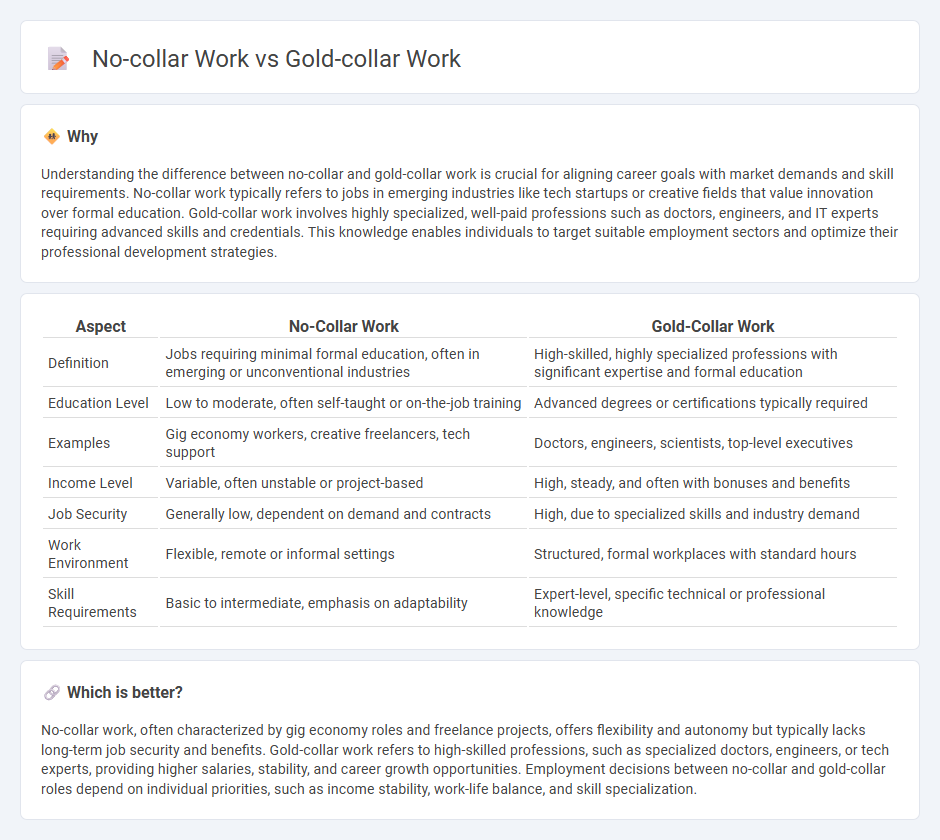
No-collar work refers to roles that often emphasize creativity, flexibility, and non-traditional career paths, commonly found in industries like tech startups, creative arts, and gig economy jobs. Gold-collar work comprises highly skilled professionals such as doctors, engineers, and IT specialists, renowned for their expertise and high earning potential. Explore the distinct characteristics and trends shaping no-collar and gold-collar employment sectors to understand their impact on the modern workforce.
Why it is important
Understanding the difference between no-collar and gold-collar work is crucial for aligning career goals with market demands and skill requirements. No-collar work typically refers to jobs in emerging industries like tech startups or creative fields that value innovation over formal education. Gold-collar work involves highly specialized, well-paid professions such as doctors, engineers, and IT experts requiring advanced skills and credentials. This knowledge enables individuals to target suitable employment sectors and optimize their professional development strategies.
Comparison Table
| Aspect | No-Collar Work | Gold-Collar Work |
|---|---|---|
| Definition | Jobs requiring minimal formal education, often in emerging or unconventional industries | High-skilled, highly specialized professions with significant expertise and formal education |
| Education Level | Low to moderate, often self-taught or on-the-job training | Advanced degrees or certifications typically required |
| Examples | Gig economy workers, creative freelancers, tech support | Doctors, engineers, scientists, top-level executives |
| Income Level | Variable, often unstable or project-based | High, steady, and often with bonuses and benefits |
| Job Security | Generally low, dependent on demand and contracts | High, due to specialized skills and industry demand |
| Work Environment | Flexible, remote or informal settings | Structured, formal workplaces with standard hours |
| Skill Requirements | Basic to intermediate, emphasis on adaptability | Expert-level, specific technical or professional knowledge |
Which is better?
No-collar work, often characterized by gig economy roles and freelance projects, offers flexibility and autonomy but typically lacks long-term job security and benefits. Gold-collar work refers to high-skilled professions, such as specialized doctors, engineers, or tech experts, providing higher salaries, stability, and career growth opportunities. Employment decisions between no-collar and gold-collar roles depend on individual priorities, such as income stability, work-life balance, and skill specialization.
Connection
No-collar work, characterized by creative and flexible roles often in tech or gig economies, complements gold-collar work, which involves highly specialized, knowledge-intensive professions such as surgeons or engineers. Both sectors demand advanced skills and adaptability, emphasizing continuous learning and innovation to meet evolving market needs. The synergy between no-collar and gold-collar jobs drives economic growth by blending creative problem-solving with expert technical execution.
Key Terms
Specialized Skills
Gold-collar work emphasizes highly specialized skills in fields such as engineering, healthcare, and technology, requiring advanced education and expert knowledge. No-collar work, often associated with creative, autonomous, or non-traditional roles, relies on unique talents and innovation rather than formal qualifications. Explore our detailed analysis to understand how these contrasting skill sets shape modern workforce dynamics.
Autonomy
Gold-collar work, typically performed by highly skilled professionals such as doctors, engineers, and creative artists, is characterized by significant autonomy, allowing individuals to make independent decisions and manage their workflows. In contrast, no-collar work often involves roles where traditional hierarchies and rigid structures are minimal or absent, yet these positions may vary widely in autonomy depending on the industry and specific job functions. Explore the distinctions in autonomy between gold-collar and no-collar work to better understand their impact on job satisfaction and productivity.
Traditional Employment Structure
Gold-collar work typically refers to highly skilled professionals in specialized industries such as technology, finance, and healthcare who command premium salaries and benefits within the traditional employment structure. No-collar work describes roles that fall outside conventional corporate settings, often characterized by freelance, gig, or creative economy roles lacking formal office environments and rigid hierarchies. Explore further to understand how these contrasting employment models impact workforce dynamics and career development.
Source and External Links
Gold Collar Job: Meaning, Profile, Salary, Apply Now - Gold-collar jobs are high-skilled, high-paying roles combining advanced technical expertise with leadership and innovation, often found in rapidly evolving industries like AI, cybersecurity, and biotechnology, requiring both specialized skills and strategic vision.
Understanding the Term "Gold-Collar Worker" - YouTube - Gold-collar workers represent a new workforce segment that bridges blue- and white-collar jobs by combining technical expertise with creativity and innovation, emphasizing their rising importance in the economy.
Designation of workers by collar color - Wikipedia - The term "gold collar" refers to workers whose roles blend characteristics of blue- and white-collar work, often indicating young, highly skilled professionals whose jobs focus more on knowledge and expertise than manual labor.
 dowidth.com
dowidth.com